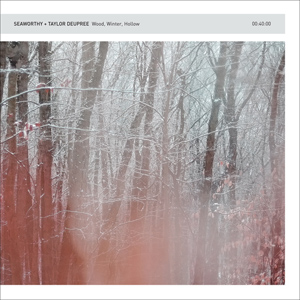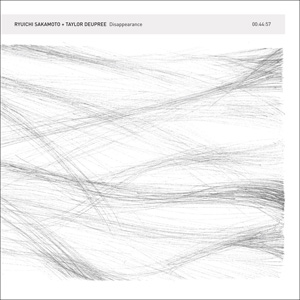Seaworthy & Taylor Deupree, "Wood, Winter, Hollow"/Ryuichi Sakamoto & Taylor Deupree, "Disappearance"
 Even though 12k head Taylor Deupree has made it a point in recent years to focus on face-to-face collaborations (as opposed to file swapping), the two most recent products of this have their own distinct sense of isolation and loneliness to them. With Cameron Webb's Seaworthy, it is literal: the record perfectly captures the feeling of being alone in the woods with only an acoustic guitar present. With legendary artist Ryuichi Sakamoto, it is more of an implied, intimate and hushed loneliness via muted tones and extended ambience.
Even though 12k head Taylor Deupree has made it a point in recent years to focus on face-to-face collaborations (as opposed to file swapping), the two most recent products of this have their own distinct sense of isolation and loneliness to them. With Cameron Webb's Seaworthy, it is literal: the record perfectly captures the feeling of being alone in the woods with only an acoustic guitar present. With legendary artist Ryuichi Sakamoto, it is more of an implied, intimate and hushed loneliness via muted tones and extended ambience.
Wood, Winter, Hollow is the most organic and stripped down of these two projects, with untreated field recordings interspersed between the three long pieces.Recorded during the winter in a New York nature reserve after Hurricane Sandy, the constant sound of snapping branches conjures the disarray of the area perfectly.With the absence of animal life due to the season, there is a cold isolation prominent throughout.
These recordings make their way into the three compositions reflected in the title."Wood" sounds like riverside recordings, with heavy emphasis on acoustic guitar that may have only the slightest of processing and treatment to them.The electronic influence is a little more prevalent on "Winter", with some ever so slight pitch bending and intentional digital clipping to offset the guitar.What might be a soft passage of electronics (or electronically treated organic instrumentation) cautiously underscores everything, even when it ends in an uncharacteristically lo-fi collapse.
"Hollow" turns up some bells to be paired alongside the guitar, with what may be actual analog synths making themselves known, even with the more aggressive field recordings.The latter moments become surprisingly raw and chaotic, given the otherwise restrained nature of the album, but then end in a quiet, tranquil moment.
samples:

Disappearance, Deupree’s collaboration with Sakamoto, is more of a studio product, and unsurprisingly has some obvious, untreated piano playing.However, at times the notes are just as important as the sounds surrounding them, such as the varying registered tones of "Jyaku," which are interspersed with what sounds like in-studio found sounds and organic movements.
The sparseness is upset by bits of digital interference and more monolithic, expansive tones on "Frozen Fountain," which manages to be simultaneously rich, yet sparse in its overall composition.Buzzing strings and a delicate, churning textural foundation on "Ghost Road" are a perfect fit for the title, conjuring a sense of passing spirits in the distance.
"This Window" in some ways feels like a subtle reference to the Wood, Winter, Hollow with its sounds feeling like an isolated, chilly forest, albeit underscored by a piano flourish.Slowly, but steadily, it transitions from frigid, gale winds into a rich passage of tone and an inviting warmth.
Ichiko Aoba makes an appearance on the long closer "Curl to Me," with her heartbeat becoming the rhythmic foundation.Filtered rising and falling tones and elongated, stretched out tones make for a beautiful, yet isolated experience, with the heartbeat feeling like the only organic elements to be had.Aoba's vocals appear too, and they are so slow and faint they are almost imperceptible, but work perfectly given the intimacy of the song.
I was impressed with the moments on Wood, Winter, Hollow in which things took on more clearly dissonant, low fidelity turns, but as a whole Disappearance is the richer experience for me.The guitar and field recordings on the former is a bit too rooted in Deupree's comfort zone, so I was pleased to hear his distinct, light touch given to an album that sounded a lot different than his recent works, which is the case with Disappearance.Both, however, are exemplary, yet significantly different albums of minimalist brilliance.
samples:
 



